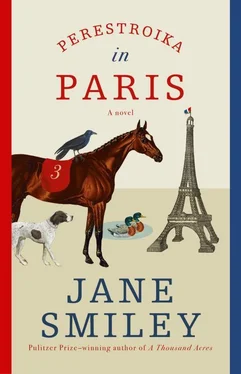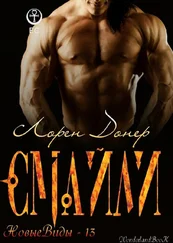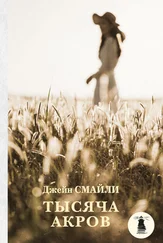After the morning training was over, and the horses were quietly eating from their hay nets and Rania was listening to a tune on her iPhone, and Delphine should have been heading to her office to make out bills, she got into her car and drove into Paris. It was not that she thought Paras was in Paris. But she did think that getting away from Maisons-Laffitte might somehow give her a new idea about what to do—either how to find her or how to give up on finding her.
It took about an hour, and there she was on the Périphérique, on the west side, and she could not help herself, she got off at Neuilly. She often got off at Neuilly, but she always turned south and headed down the Avenue de Malakoff. Now she went east, toward the Arc and the Champs-Élysées, something she hadn’t done in years. She disappeared, as she felt, into the maelstrom. Part of the problem was motorcycles zooming everywhere, the machines and the riders the same color, carrying the same brilliant shine, curving around her inside a cloud of noise. As she circled the Arc, the other cars seemed to swarm like bees attacking. She felt lucky that there were no bumps, that she was spit out at the turn into the Champs-Élysées without mishap in some mysterious way. Delphine had ridden in horse races, some of them with fifteen or twenty entries who bunched and spread out at fifty to sixty kilometers per hour. But, maybe for that very reason, she didn’t trust cars. Cars had no sense of a herd, no perception along their bodies of where the other cars were. Cars relied on their drivers much more than horses relied on their jockeys. She was panting as she passed Cartier, Swarovski, the Hôtel George V. These expensive places were routine for Madeleine, so why should the woman not do whatever she wanted with her money? Beautifully pruned horse chestnuts rose above the traffic like cliffs above a canyon, and all the pedestrians seemed to be staring at her, watching her drown. There was of course nowhere to pull over, so she kept her hands on the wheel and her foot on the gas, but she did not know why she had made this trip, or what it meant. All she knew was that her horse had disappeared, just a horse, not a great horse, not a horse even as good as Alphabezique, a pretty horse, an interesting horse, but horses came and went all the time. Why could she not get over this one? But, of course, it was the mystery of the whole thing, the possibility that Paras had died in some cruel way.
Then there was some greenery, then there was the Place de la Concorde, then there was some more greenery—oh, yes, Les Tuileries. Sometime late in the afternoon—nowhere near dark, but the shadows were lengthening—she came to. She was on the Avenue de Suffren. It was hard to say where she had been—the Parc Monceau came to mind, but so did Montparnasse. How could she have ranged so widely without realizing it? There was a parking place down the street from the soccer field. She whipped into it, turned off the car, and sat there for a long moment. Up since 4:30 a.m., she was worn out. She emerged from the car and walked around it. No new dents, no new scrapes. She must have stayed out of trouble. The thing to do was to call Rania and have her take the train into town and pick her up. She would think of something to say between now and then.
But when she checked her phone, she saw that it was dead. So, if she wanted to come to her senses, it would have to be coffee, then. She walked into a café and bakery.
After her second cup, she was back to normal. What it was like, she had to admit, was the day she rode her first race as an amateur jockey. She didn’t ride races anymore, but at that time, ten years ago now, she’d had a wonderful old gelding, a horse with dozens of races under his belt at eight years old, still sound, still ready to run. She had forced herself to do it—to ride, to get in shape, to work the old fellow every day—and then she had entered him in a race right there in Maisons-Laffitte. But from the moment she woke up on the morning of the race, she might as well have been on Mars—she couldn’t breathe the air, she didn’t feel as though she was sticking to the Earth when she walked, and all through the race everything seemed to move slowly and at light-speed at the same time. They had come in fifth, she had won a thousand euros, the sense of being lost in the universe had lasted for the rest of the afternoon, and then, all of a sudden, she was awake, she knew that they had both survived, and for some reason that escaped all logic, she was committed to racing again, to having a few more horses, to embarking on this career. But for years after that, when people asked her about her first race, she’d said, “I don’t remember a thing.” She took a bite of her roll. It was an odd version, maybe something from down south, buttery but not a croissant, sprinkled with fennel seed. She took another bite. She might have liked a second one, but she had to keep her weight down if she was going to do her share of the training and stay in the horse business.
Anaïs saw her. Anaïs came in once a week to help in the afternoon and to sort out the books before they went to the accountant. A woman, not old but all dried and brown, sat quietly at a table by the window, in tight pants, dirty boots, horseback-riding clothes. No one had dared wear such apparel in this bakery for years, if ever, and the other servers and the patrons looked offended, but Anaïs was fascinated. The woman seemed to be enjoying Anaïs’s own modest fennel-seed creation, so she picked up a little tray and walked over to her. Yes, the woman gave off a countryside fragrance, you might say, but it wasn’t unpleasant to someone who had laid her forehead against the neck of a horse about twelve hours before. She said, “Good day, madame. May I offer you something else? Another small roll, perhaps?”
The woman looked up at her. She looked exhausted. She said, “No, but thank you very much. This one is quite delicious.”
“Thank you, madame. It’s my own creation. I like to make new things to amuse myself. Our customers do seem to particularly appreciate this one.” Now was the time, Anaïs thought, to ask about horses, to ask if a real horse could possibly wander the streets of Paris at night, accompanied by a raven, who sometimes perched between the horse’s ears in order to receive a grape, a horse who disappeared at the break of dawn, whose gaze seemed uncanny, almost flickering with light, who, she sometimes thought, had just the ghost of a halo hovering above her. She said, “Excuse me, madame—”
AND THE WOMAN SAID, “No thanks!,” sounding as if she meant “No, thank you, do not address me, I need nothing from you,” and so Anaïs decided once again that it was better to keep her nighttime escapades to herself.
Although Étienne was somewhat uneasy about how much his great-grandmama was sleeping lately, she was still eating her usual amount, still making her trips to the shops, and seemed to be happy, so he made use of the fact that she took a nap after her breakfast to go outside and ride Paras around the courtyard. It was easy now. There were ten steps from the courtyard to the portico. He climbed to the sixth step, and she sidled up to him. It was easy to grasp her thick, tangly mane and slide his leg over her back. She always waited quietly until he felt evenly balanced, and then, before he said, “Go!,” she ambled away, here and there over the grass. He was high enough to look in the windows, but not over the tops of the shrubbery, so he could hear people walking, talking, or running (he could tell by the quickness of their stride), humming, and he could hear a dog bark every so often, but he couldn’t see anyone, and, he was confident, no one could see him. Sometimes the two of them walked here and there for hours, and as they did, he let his mind wander. Because he had lived such an isolated life, there was no place for his mind to wander except around the worlds of the books he had read, but that was enough for now. He could imagine twenty thousand leagues under the sea, cold and black; he could imagine Emperor Hadrian; he could imagine the plague; he could imagine Gargantua and Pantagruel, though possibly no one in the world would recognize what he was imagining. Étienne was willing to read anything, even if he only understood one word out of ten. He could even imagine London, since one of the books he liked to read was a French translation of David Copperfield, an edition that had been lovingly perused by someone—there were all sorts of spidery notes in the margins. He had looked for another Dickens, but not found one.
Читать дальше











